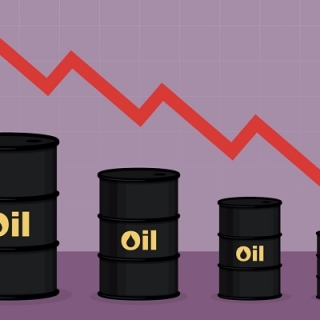


Oil prices weakened on Friday (July 25th) and closed at a three-week low as traders worried about negative economic news from the US and China and signs of increasing supply.
The losses were limited by optimism that a US trade deal could boost global economic growth and future oil demand.
Brent crude futures fell 74 cents, or 1.1%, to $68.44, while US West Texas Intermediate (WTI) crude fell 87 cents, or 1.3%, to $65.16.
This was the lowest closing level for Brent since July 4th and WTI since June 30th. For the week, Brent fell about 1% while WTI fell about 3%. European Commission President Ursula von der Leyen will meet with US President Donald Trump on Sunday in Scotland. EU officials and diplomats have said they hope to reach a trade framework agreement later this week.
The eurozone economy remains resilient amid widespread uncertainty stemming from the global trade war, a raft of data showed on Friday, even as European Central Bank policymakers appeared to temper market speculation that further interest rate cuts would be avoided.
In the US, new orders for US-made capital goods unexpectedly fell in June while shipments of such products rose modestly, suggesting that business spending on equipment slowed significantly in the second quarter.
Trump said he had a good meeting with Federal Reserve Chairman Jerome Powell and got the impression that the US central bank chief may be ready to cut interest rates. Lower interest rates reduce consumer borrowing costs and can boost economic growth and oil demand.
In China, the world's second-largest economy, fiscal revenue fell 0.3% in the first six months from a year earlier, the Finance Ministry said, maintaining the rate of decline seen between January and May. (alg)
Source: Reuters
Oil prices stabilized on Thursday (February 12th), as the market reassigned a risk premium to US-Iran tensions despite US inventory data showing swelling domestic supplies. This movement confirms one ...
Oil prices rose on Wednesday (February 11th), supported by a combination of geopolitical risk premiums from US-Iran tensions and more solid Asian demand signals particularly from India which helped ea...
Oil remained in the green zone on Tuesday (February 10th), as the market refused to abandon the Middle East risk premium. As of 13:07 GMT (20:07 WIB), Brent rose +0.4% to $69.32/barrel, while WTI rose...
Oil prices fell about 1% on Monday as concerns about conflict in the Middle East eased slightly. The market calmed after the US and Iran agreed to resume talks on Tehran's nuclear program, reducing fe...
Oil prices moved slightly higher in a volatile session on Friday, as investors assessed the direction of nuclear negotiations between the United States and Iran. Price movements appeared sensitive to ...
Oil prices stabilized on Thursday (February 12th), as the market reassigned a risk premium to US-Iran tensions despite US inventory data showing swelling domestic supplies. This movement confirms one thing: geopolitical headlines are still more...
Gold prices weakened slightly on Thursday (February 12th), as more solid US employment data reduced market confidence in an imminent Federal Reserve interest rate cut. The strong employment data prompted market participants to shift expectations of...
The Hang Seng Index reversed its downward trend in Hong Kong on Thursday (February 12th), weakening by around 0.9% to around 27,000 after a strong session earlier. This decline halted the momentum of the short term rally, as investors began to...